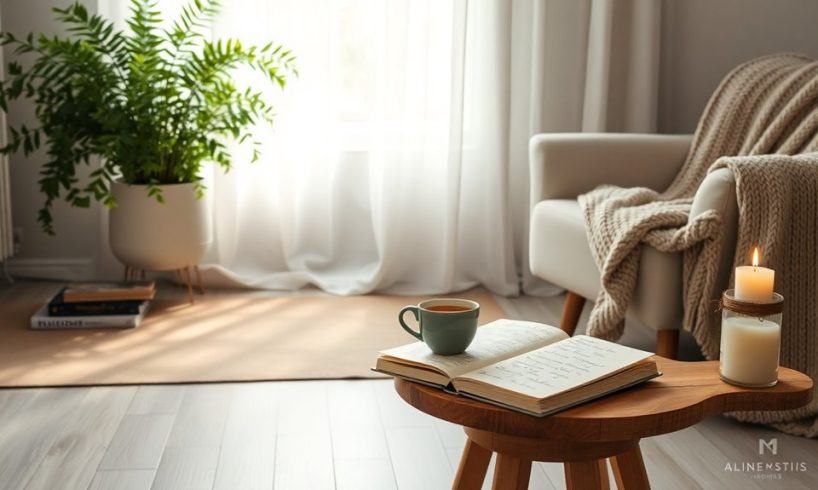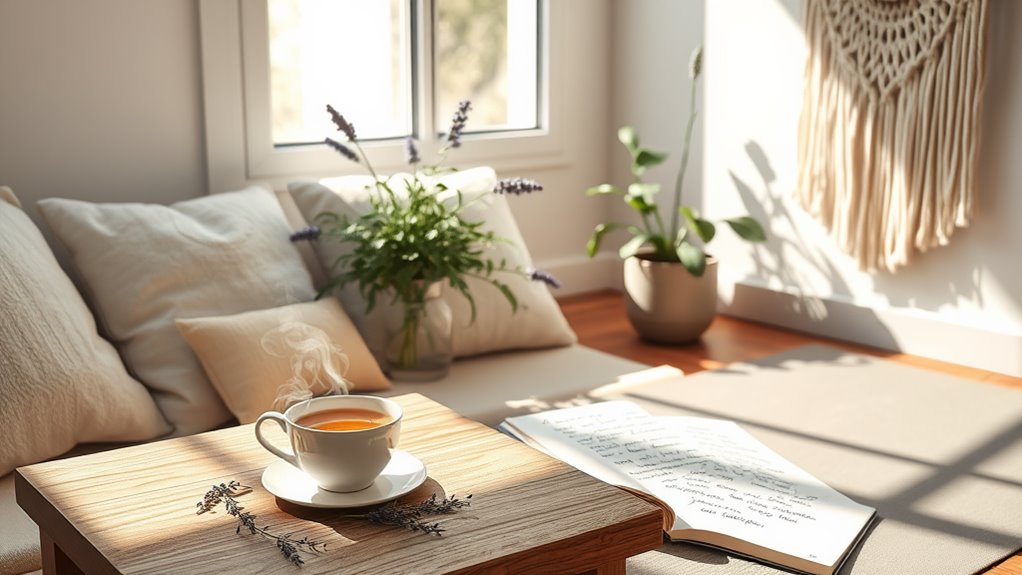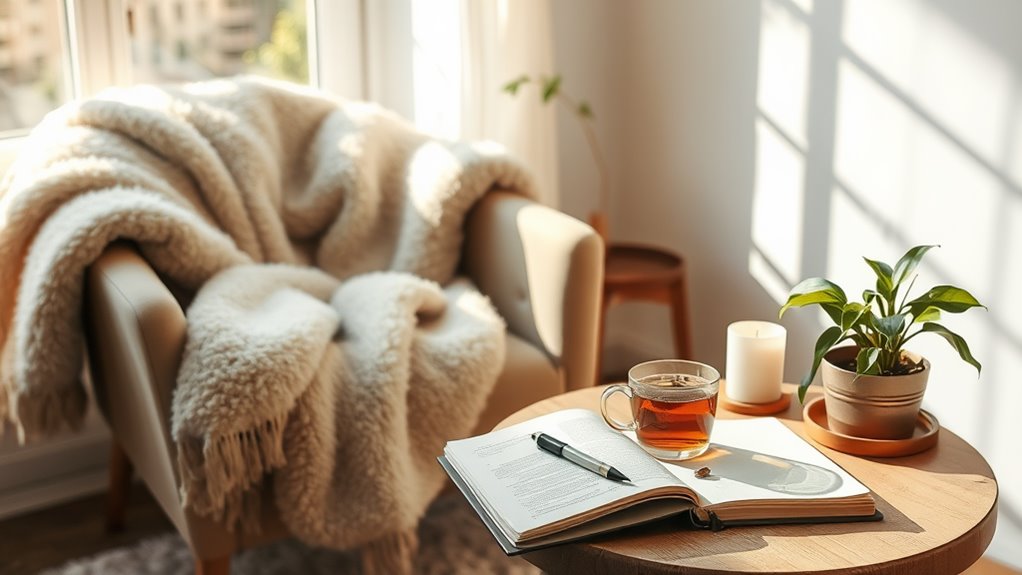
Is it true that prioritizing self-care can greatly enhance your overall well-being? While many people advocate for its benefits, the practical application often leads to uncertainty about where to start or how to maintain consistency. Understanding the balance between self-care and mindfulness might just hold the key to revealing a healthier, more fulfilling lifestyle. As you consider your own habits and routines, it raises the question: what steps can you take to integrate these practices effectively into your daily life?
Main Points
- Self-care is vital for mental, emotional, and physical health, enhancing resilience and overall well-being.
- Mindfulness practices, such as breath awareness and gratitude journaling, improve focus and emotional regulation.
- Regular self-care routines contribute to long-term mental health and strengthen relationships through positive self-engagement.
- Creating a peaceful space and scheduling self-care activities as non-negotiable appointments fosters commitment and stability.
- Mindfulness reduces stress, encourages present-moment awareness, and promotes a fulfilling life experience through improved communication and emotional resilience.
Understanding Self-Care

Self-care isn't just a buzzword; it's an essential practice for your overall well-being. Understanding self-care means recognizing the importance of prioritizing your physical, emotional, and mental health. You might think of self-care as a luxury, but it's actually a necessity, especially in today's fast-paced world. Engaging in self-care can also help mitigate the effects of emotional and psychological challenges associated with cognitive disorders, allowing for a more grounded approach to recovery, as research shows that understanding cognitive processes can enhance therapeutic approaches.
Start by identifying what self-care looks like for you. It can be as simple as taking a walk, reading a book, or enjoying a warm bath. These activities aren't just indulgent; they recharge your batteries and help you face daily challenges with renewed energy. Incorporate self-care into your routine. Schedule time for it, just like you'd schedule a meeting or a doctor's appointment. It's imperative to listen to your body and mind, knowing when to slow down or take a break. Engaging in self-care can also play a vital role in improving cognitive functions, which is particularly important for those recovering from cognitive disorders.
You deserve to feel balanced and fulfilled, so don't underestimate the power of self-care. When you actively engage in self-care, you're not just improving your own well-being; you're also better equipped to support others in your life. Remember, self-care isn't selfish; it's an essential part of living a healthy, happy life.
The Role of Mindfulness
Mindfulness plays an essential role in enhancing your self-care routine. By practicing mindfulness, you can experience significant benefits, such as reduced stress and improved focus. Let's explore some effective techniques that can help you integrate mindful living into your daily life. Additionally, mindfulness can help mitigate the effects of cognitive dissonance, allowing individuals to align their beliefs and actions more closely.
Benefits of Mindfulness Practice
Practicing mindfulness can transform your daily experiences by helping you stay present and engaged. When you focus on the here and now, you'll notice a reduction in stress and anxiety. This heightened awareness allows you to respond to situations more thoughtfully instead of reacting impulsively, which can lead to better decision-making.
Mindfulness also enhances your emotional resilience. By recognizing your thoughts and feelings without judgment, you're able to process emotions more effectively. This can lead to increased self-awareness and a greater understanding of your motivations. As a result, you may find that your relationships improve, as you become better at listening and empathizing with others.
Moreover, regular mindfulness practice can improve your concentration and attention span. By training your mind to focus on the present, you'll find it easier to complete tasks without getting sidetracked. This can lead to increased productivity and satisfaction in both your personal and professional life.
Finally, embracing mindfulness fosters a sense of gratitude and appreciation for the small moments in life. When you cultivate this mindset, you're likely to experience a deeper sense of fulfillment and joy each day.
Techniques for Mindful Living
Often, incorporating mindfulness techniques into your daily routine can greatly enhance your overall well-being. By practicing mindfulness, you can create a sense of calm and focus, allowing you to navigate life's challenges with ease. Here are some effective techniques you can try:
- Breath Awareness: Take a few moments each day to focus solely on your breath. Inhale deeply, hold, and exhale slowly. This simple practice can ground you in the present moment.
- Mindful Eating: When you eat, eliminate distractions and savor each bite. Pay attention to the flavors, textures, and aromas of your food, which can transform your relationship with meals.
- Body Scan Meditation: Lie down comfortably and mentally scan your body from head to toe. Notice any areas of tension or discomfort, and consciously relax those parts.
- Gratitude Journaling: Each day, jot down three things you're grateful for. This practice shifts your focus from what's lacking to the abundance in your life, fostering a positive mindset.
Benefits of Practicing Self-Care

Embracing self-care can greatly enhance your overall well-being. When you prioritize your needs, you create a foundation for better physical and mental health. By regularly engaging in self-care practices, you can reduce stress levels, which in turn helps improve your mood and boost your energy. You'll notice that a little time for yourself can reignite your passion and motivation.
Practicing self-care also fosters a deeper connection with yourself. When you take the time to reflect on your feelings and desires, you become more in tune with your needs. This awareness allows you to make better decisions that align with your values. Additionally, self-care can strengthen your resilience. By nurturing yourself, you're better equipped to handle life's challenges and bounce back from setbacks.
Moreover, self-care can enhance your relationships. When you feel good about yourself, you're more likely to engage positively with others. By setting aside time to recharge, you can show up as your best self, fostering healthier, more meaningful connections. Ultimately, incorporating self-care into your daily routine isn't just a luxury; it's a necessity for a balanced, fulfilling life. So, start prioritizing yourself today!
Mindfulness Techniques to Try
While the concept of mindfulness may seem intimidating at first, incorporating simple techniques into your daily routine can make a significant difference in your mental clarity and emotional well-being. You don't need to meditate for hours or retreat to a quiet place to experience mindfulness. Here are some practical techniques you can try:
- Breath Awareness: Spend a few minutes focusing solely on your breath. Notice the sensation of air entering and leaving your body. This helps ground you in the present moment.
- Body Scan: Lie down comfortably and mentally scan your body from head to toe. Notice any tension or discomfort and consciously relax those areas.
- Mindful Eating: During meals, take your time. Savor each bite, paying attention to flavors and textures. This not only enhances your eating experience but promotes gratitude.
- Nature Walk: Go for a walk in nature, fully engaging your senses. Observe the colors, sounds, and smells around you. This encourages a deeper connection to your environment.
Creating a Self-Care Routine

Creating a self-care routine is crucial for maintaining your mental and emotional health. Start by identifying activities that uplift and recharge you—whether it's reading, meditating, or simply enjoying a warm bath. Set aside specific times in your week to engage in these activities, treating them as non-negotiable appointments for your well-being.
Next, prioritize balance. Incorporate a mix of physical, emotional, and social self-care practices. Schedule workouts or nature walks to boost your physical health, while also carving out time for journaling or chatting with a friend to nurture your emotional state.
Don't forget about your environment. A clutter-free, peaceful space can greatly enhance your self-care experience. Dedicate a few minutes each day to tidy up and create a calming atmosphere.
Finally, be flexible and adjust your routine as needed. Life can be unpredictable, so it's okay to shift your self-care practices when necessary. The key is consistency; even small efforts can make a considerable impact over time. Remember, self-care isn't selfish—it's a crucial investment in your overall well-being. Start today, and watch how it transforms your mental and emotional landscape.
Overcoming Barriers to Mindfulness
Building a self-care routine can lay the groundwork for a mindful life, but many people face obstacles that hinder their ability to fully engage in mindfulness practices. Recognizing and addressing these barriers is essential for cultivating a consistent mindfulness practice.
First, consider the time constraints in your daily life. You might feel like you don't have a moment to spare, but even a few minutes of mindfulness can make a difference. Second, distractions from technology can pull your attention away from the present moment. Try setting boundaries around your device usage. Third, self-doubt may creep in, making you question your ability to practice mindfulness effectively. Remember, mindfulness is a journey, and it's okay to start small. Finally, an overwhelming environment can make it hard to concentrate. Create a designated space for your practice that feels calming and inviting.
By addressing these barriers, you can create a more supportive environment for mindfulness. Here are some strategies to help you overcome these challenges:
- Set specific times for practice.
- Limit tech distractions.
- Practice self-compassion.
- Create a peaceful practice space.
With determination, you can integrate mindfulness into your life.
Frequently Asked Questions
How Long Should I Practice Mindfulness Each Day?
You should aim for at least 10 to 20 minutes each day. This consistent practice helps you develop awareness and enhance your focus. Start small, then gradually increase your time as you feel more comfortable.
Can Self-Care Look Different for Everyone?
Absolutely, self-care can look different for everyone. You might find joy in exercise, while someone else prefers reading. It's important to explore what replenishes you, ensuring it aligns with your unique needs and preferences.
Is Mindfulness Only for Stressful Situations?
Did you know that 60% of people practice mindfulness outside stressful situations? Mindfulness isn't just for tough times; it enhances everyday moments, helping you appreciate life, stay present, and create a deeper connection with your experiences.
What if I Feel Guilty for Taking Time for Myself?
Feeling guilty for taking time for yourself is common, but it's important to remember you deserve that time. Prioritizing your well-being can actually enhance your ability to support others and handle responsibilities effectively.
How Do I Stay Consistent With My Self-Care Routine?
To stay consistent with your routine, set specific times for activities, track your progress, and remind yourself of the benefits. Celebrate small wins, and don't hesitate to adjust your approach if needed. You've got this!
Read The Next Blog Post –
Embracing self-care and mindfulness isn't just about pampering yourself; it's about nurturing your mind, body, and spirit. By prioritizing your needs, practicing present-moment awareness, and creating a routine, you're investing in a healthier, happier you. So, take a moment to breathe, reflect on what matters, and commit to your well-being. As you cultivate these practices, you'll discover resilience, clarity, and a deeper connection to yourself—transforming daily challenges into opportunities for growth and fulfillment.








